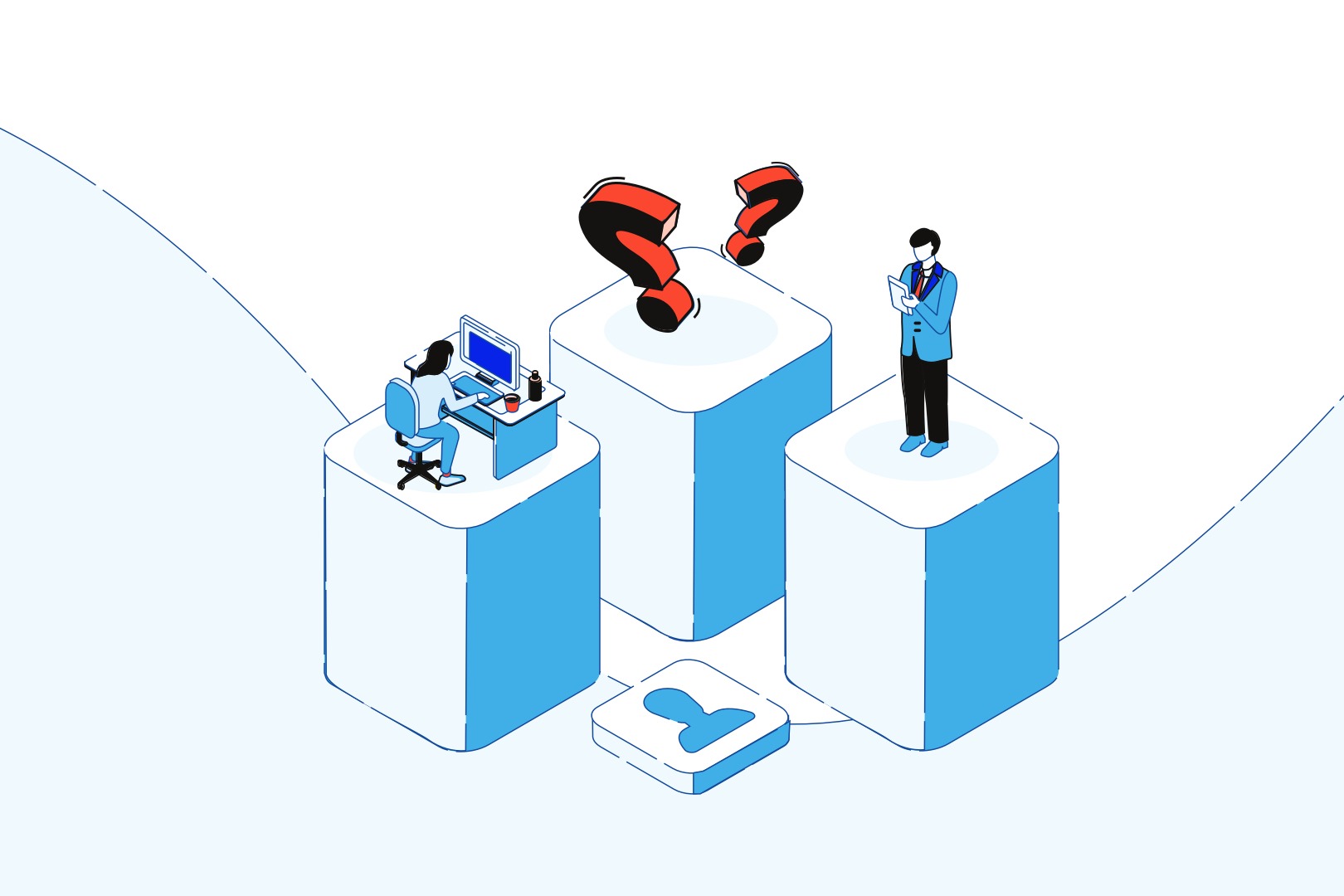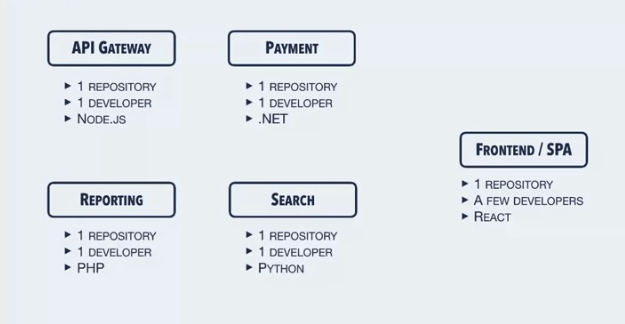06 June 2023
Microservices interview questions: How to prepare for a microservice-oriented developer position?

Microservices architecture is becoming increasingly popular. With all the performance and scalability benefits it provides, it’s not a surprise that many innovative businesses as well as software houses put more and more emphasis on it. And since microservices can be developed with various technologies, the search for a perfect microservices-oriented backend developer is not limited to one programming language. A position like this can be quite lucrative for a candidate. But what kind of questions can you expect during an interview?
Microservices interview questions is a topic that’s really just a part of a bigger issues, that is, the role of service oriented architecture in today’s software development as well as their relationship with other technologies and specializations. That’s why in this article, you’re going to find out:
- what’s the place of architectures based on multiple services in our technology stack,
- what does it take to become a microservices-oriented developer,
- whether general experience in backend is enough to get such a position,</li
- what are the most important microservices-related skills for you to master,
- and, of course, the actual microservices interview questions and answers.
Why should you take our advice when it comes to microservices?
Microservices at The Software House
We’re continuing our series on interview questions for developers. If you haven’t yet, try our PHP interview questions article, or get straight to today’s topic – microservices interview questions.
In our everyday work at The Software House, projects based on microservices, architectures that consist of a bunch of small autonomous services, are more and more common. No wonder – according to research by The Business Research Company, the microservices architecture market is going to grow to $10.86 billion in 2027.
To prepare for the challenge, not only do we help our devs grow in this direction, but also search for developers who took interest in this architectural style already.
While the topic of microservices is not limited to Node.js, it’s true that many Node.js-based projects tend to go for microservices.
That’s why, as TSH’s VP of Technology and experienced Node.js developer, I can tell you a thing or two about microservices interview questions. A lot of it is also incorporated into a typical interview for a backend developer at TSH and other companies that keep up with what’s going on in the software development market today.
Microservices-oriented developer – how to approach an interview?
The topic of microservices-based architecture is highly connected to various software development areas, even Quality Assurance as automated tests for microservices is a highly interesting subject too. It’s not even all that much about Node.js. It has much more to do with skills typical for DevOps specialists, those knowledgeable about data centers etc.
When preparing for an interview like this, a candidate should brush up on topics such as distributed systems, containerization, testability and debugging of such systems.
Knowledge of deployment methods and tools for developing a distributed architecture may prove vital as well.
Some of the tools you should know something about include Kubernetes and Continuous Integration tools such as Jenkins, Bitbucket Pipelines or Circle CI. High-level knowledge of Amazon Web Services can be a great bonus.

⏰ Find out how skilled your team is at using observability — in 5 mins
Your new developers should also know how to make sense of the complexity of microservices-based systems. The test ranks the efficiency of your company-wide observability practices in a couple minutes. Free & no registration needed. 👇
Experienced in backend, newbie in microservices – no-go?
Absolutely no! As a matter of fact, the very first step to get into microservices architecture is to understand how to build monolithic applications.
A lot of these skills are very much applicable to microservices. This includes all the steps necessary to keep the app running, such as communication methods, queuing, containerization, logging, tracing etc. Some architecture-related skills such as module separation are also very useful.
Microservices-oriented developer – most important skills to master
Generally speaking, in order to function well in the world of microservices and be able to quickly address any gaps in knowledge, you should have considerable experience in two areas:
The communication area
Microservices don’t just communicate with the outside world and various external systems. Primarily, they communicate with each other (including service discovery).
The fact that each of our multiple microservices needs to react to events generated by other services is something completely new to devs that haven’t worked on microservices before and never worked on projects that take advantage of event queuing or low-level communication via gRPC.
The DevOps area
DevOps-related topics are very important to developers that work with microservices. Tracing, logs, containerization, various metrics, service response to events, mocking of third party systems for further development – just a few examples of skills that may prove essential.
These topics are what you might call a foundation of a developer specialized (or at the very least set to get specialized) in microservices. It’s very important to learn as much about it as you can before you go to an interview.
Typical microservices interview questions
What kind of specific questions can you expect during an actual interview? Based on my experience, good recruiters are going to ask questions that not only test the theoretical knowledge but also how you are able to apply it to various challenges.
Here are some examples of that:
- What are the pros and cons of using monorepos in the context of microservices?
- How to program a process that requires activity from more than one service in order to be executed successfully? What if one of the services fails?
- Is it necessary to supply the frontend layer with information on all services when there are a lot of services available?
- What are the most common methods of communication between services? What are their pros and cons? Why is a single service calling multiple services?
- What are the most popular techniques for request debugging in distributed systems?
- What are some of the biggest advantages of microservices and are you able to explain their practical implications (e.g. fault isolation, business domain isolation). You don’t need to focus on technicalities alone. The business capabilities of microservices are after all strongly tied to the technology.
- What are the biggest disadvantages of microservices and how to mitigate them?
- Can you provide examples of projects for which microservices are well or poorly suited? Can you provide arguments for these choices?
- Can you briefly describe all the software components of microservices?
That’s it for the questions but stay with me for a while longer. I’ve got one final piece of advice for you.
Microservices-oriented developer – final piece of advice
Still not sure if you know how to approach this interview?
As you prepare, try to follow these steps:
- Start with learning and practicing containerization. You are very likely to fail an interview for a position like this if you struggle with this topic. The ability to create Dockerfile files is essential.
- Next, focus on all of the methods that make it possible for services to communicate with each other, including events, direct communication, pros, and cons, etc.
- The next logical step is architecture. Study different ways to establish communication between microservices and an external system. Sometimes, it may be necessary for the system to know all or most of the services. At other times, it may be possible to use something like API Gateway.
- Finally, learn more about the topic of microservice monitoring. Be sure to know how to tell whether a cross-service request was successfully executed, how to manage logs, or monitor the usage of resources.
Let’s sum things up.
Microservices interview questions – summary
How do you feel after reading this article? Are you up for the challenge already, or perhaps there is still a lot for you to learn?
Microservices may seem quite intimidating at first, as they incorporate knowledge from many areas and require developers used to the monolithic architecture to unlearn some habits.
But as an architecture that supports innovative and highly scalable systems, microservices are bound to be popular with extremely interesting and lucrative projects. This makes microservices a great specialization for a developer, regardless of their programming foundation.
So remember:
- microservices are not unique to a specific programming language, but Node.js is a perfect fit for them.
- backend developers from all walks of life can potentially become great microservices-oriented devs,
- microservices-based aproach requires you to change the way you think about software architecture.
Good luck with your interview!
Whether you are preparing for an interview or not, you should consider microservices-based development as an important skill to acquire.
They will definitely be of great help when applying for one of the job openings at The Software House.

